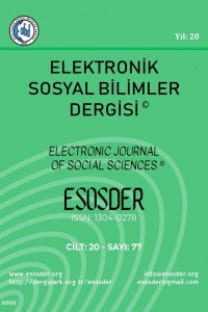OSMANLI’DA İKTİSADİ DÜŞÜNCENİN GELİŞMESİ/EVRİMİ: İKİ BAKIŞ AÇISININ KARŞILAŞTIRILMASI
History of economics, History of economic thought, ottoman, normative and positive approaches
THE EVOLUTİON OF OTTOMAN ECONOMİC THOUGHT: A COMPARİSON OF TWO PERSPECTİVES
___
- Barkan, Ömer L. (1951) Bibliyografya: İktisadi İnhitat Tarihimizin Ahlak ve Zihniyet Meseleleri, İktisat Fakültesi Mecmuası, Cilt:12, Sayı 3-4.
- Barkan, Ömer L. (1980). Milli Kurtuluş Hareketlerinin İktisadi Esasları, Türkiye’de Toprak Meselesi, Toplu Eserler 1, Gözlem Yayınları.
- Berkes, N. (1984). Teokrasi ve Laiklik, Adam Yayıncılık, s. 50-51.
- Deniz, E. (2009). Sabri Fehmi Ülgener’in İktisadi-Felsefi Anlayışı, Ankara Üniversitesi Sosyal Bilimler Enstitüsü Felsefe ve Din Bilimleri Anabilim Dalı (Yayınlanmamış Yüksek Lisans Tezi), Ankara.
- Der. Andre G. F. & Barry K. G. (2003). Dünya Sistemi, Beş Yüzyıllık Mı, Beş Bin Yıllık Mı, Çev. Esin Soğancılar, Yay. Haz. Alaeddin Şenel-Yavuz Alogan, İmge Kitabevi, Ankara.
- Dursun, D. (1989). Yönetim-Din İlişkileri Açısından Osmanlı Devleti’nde Siyaset ve Din, İşaret Yayınları, İstanbul.,
- Ermiş, F. (2013). A history of Ottoman economic thought: Developments before the nineteenth century. London: Routledge.
- Fındıkoğlu, Ziyaeddin F. (1946). Türkiye’de İktisat Tarihi Tedrisatı ve İktisat Fakültesi Teşkilatı, İstanbul.
- Genç, M. (2000). Osmanlı İmparatorluğu’nda Devlet ve Ekonomi, Ötüken Yayınları, İstanbul.
- İnalcık, H. (2000). Osmanlı İmparatorluğu’nun Ekonomik ve Sosyal Tarihi 1300-1600, Cilt:1, Eren Yayıncılık.
- Kala, A. (2012). Debbağlıktan Dericiliğe İstanbul Merkezli Deri Sektörünün Doğuşu ve Gelişimi, Zeytinburnu Belediyesi Kültür Yayınları 27, İstanbul.
- Mardin, Ş. (1986). Din ve İdeoloji, İletişim Yayınları, İstanbul, s. 110, Berkes, 100 soruda Türkiye’nin İktisat Tarihi 2. Cilt.
- Mardin, Ş. (1991). Türkiye’de Din ve Siyaset Makaleler 3, İletişim Yayınları, İstanbul.
- Nişancı, Ş. (2002). 15-16. Yüzyıllarda Osmanlı İktisat Zihniyeti, Okumuş Adam Yayınları, İstanbul.
- Orman, S. (1992). İlm-i Tedbir-i Menzil, Oikonomia ve İktisat, Aile Eğitimi, Sosyo-Kültürel Değişme Sürecinde Türk Ailesi, Ankara.
- Özveren, E. (2002). Ottoman economic thought and econmc policy in transition: Rethinking the ninete- enth century. In M. Psalidopoulos, & M. Eugenia Mata (Eds.), Economic thought and policy in less develo- ped Europe: The nineteenth century (pp. 129-144). New York: Routlegde.
- Sayar, Ahmet G. (1986). Osmanlı İktisat Düşüncesinin Çağdaşlaşması, İstanbul.
- Şahin, H. (2014). “Klasik” Dönem Osmanlı Ekonomisinde İktisadi Kontrol Araçları, Bartın Üniversitesi İ.İ.B.F. Dergisi, cilt:5, sayı:10.
- Şeker, Fatih M. (2013). Osmanlı İslam Tasavvuru, Dergâh Yayınları, İstanbul.
- Tabakoğlu, A. (2005). İktisadî İnhitat Tarihimizin Ahlâk ve Zihniyet Meseleleri, İktisat Tarihi-Toplu Makaleler-I, Kitabevi Yayınları, İstanbul, ss. 453-454.
- Tabakoğlu, A. (2012). Türkiye İktisat Tarihi, Dergâh Yayınları, 11. Baskı, İstanbul.
- Tak, A. & Sabri F. Ü. (2017). İktisadi Hayat, Tasavvuf, Geleneksel Dünya ve İslam’ın Yeni Teolojisi, FSM İlmi Araştırmalar İnsan ve Toplum Toplum Bilimleri Dergisi, Sayı 10.
- Turhan, R. (2014). Türkiye’de Cumhuriyetin Erken Döneminde Max Weber Etkisi ve Bu Etkiyi Anlamak, Sosyoloji Dergisi, 3. Dizi, sayı:29,2, s. 274.
- Turner, B. S. (1991). Oryantalizm, Kapitalizm ve İslam, Çev. Ahmet Demirhan, İnsan Yayınları, İstanbul.
- Ülgener, S. (1981). İktisadi Çözülmenin Ahlak ve Zihniyet Dünyası, 2. B. İstanbul.
- Yılmaz, C. (1994). Siyasetnamelere Göre XVI. ve XVII. Yüzyıllarda Osmanlılarda İktisadi Düşünce, Yayınlanmamış Yüksek Lisans Tezi, İstanbul.
- Wallerstein, I. (2004). Modern Dünya-Sistemi, Kapitalist Tarım ve 16. Yüzyıl’da Avrupa Dünya-Ekonomisinin Kökenleri, Cilt: 1, Çev: Latif Boyacı, Bakış Yayınları, İstanbul.
- Weber, M. (1985). Protestan Ahlakı ve Kapitalizmin Ruhu, çev. Zeynep Aruoba, Hil Yayınları, İstanbul.
- ISSN: 1304-0278
- Yayın Aralığı: Yılda 4 Sayı
- Başlangıç: 2002
- Yayıncı: Cahit AYDEMİR
ENGELLİ HASTALARA YÖNELİK TIBBİ SOSYAL HİZMETLERDE HASTANE YÖNETİMİNİN ROLÜ
Muhammed Fatih ERTAŞ, Zeynep BAHÇE
OSMANLI’DA İKTİSADİ DÜŞÜNCENİN GELİŞMESİ/EVRİMİ: İKİ BAKIŞ AÇISININ KARŞILAŞTIRILMASI
Filiz DEMİR, Mehmet TEKELİ, Ezgi KIRICI TEKELİ
FATİH SULTAN MEHMED’İN SİYASİ DÜŞÜNCESİNE YÖN VEREN UNSURLAR: İSLAM, MERKEZİYETÇİLİK VE TERAKKİ
DİJİTAL DİPLOMASİ ALANINDA YAPILAN AKADEMİK ÇALIŞMALARIN BİBLİYOMETRİK ANALİZİ
YENİLİKÇİ TÜKETİME ETKİ EDEN FAKTÖRLER: GİYİLEBİLİR TEKNOLOJİ ÜZERİNE BİR ARAŞTIRMA
Özge GÖKBULUT ÖZDEMİR, Osman Erkan AÇIKGÖZ
ST. AUGUSTINE VE VITORIA'NIN YENI DÜNYA DÜZENİ ÖNERİLERİNİN SİYASAL DÜŞÜNCEYE ETKİLERİ
LİSE ÖĞRENCİLERİNİN İNTERNET BAĞIMLILIĞI, OKULA YABANCILAŞMA VE MUTLULUK DÜZEYLERİ ARASINDAKİ İLİŞKİ
